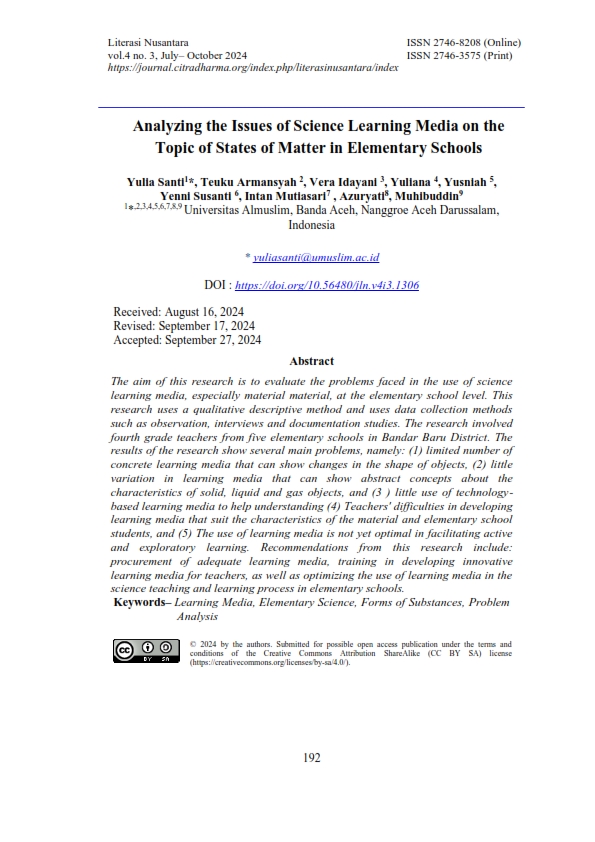Analyzing the Issues of Science Learning Media on the Topic of States of Matter in Elementary Schools
DOI:
https://doi.org/10.56480/jln.v4i3.1306Keywords:
Learning Media, Elementary Science, Forms of Substances, Problem AnalysisAbstract
The aim of this research is to evaluate the problems faced in the use of science learning media, especially material material, at the elementary school level. This research uses a qualitative descriptive method and uses data collection methods such as observation, interviews and documentation studies. The research involved fourth grade teachers from five elementary schools in Bandar Baru District. The results of the research show several main problems, namely: (1) limited number of concrete learning media that can show changes in the shape of objects, (2) little variation in learning media that can show abstract concepts about the characteristics of solid, liquid and gas objects, and (3 ) little use of technology-based learning media to help understanding (4) Teachers' difficulties in developing learning media that suit the characteristics of the material and elementary school students, and (5) The use of learning media is not yet optimal in facilitating active and exploratory learning. Recommendations from this research include: procurement of adequate learning media, training in developing innovative learning media for teachers, as well as optimizing the use of learning media in the science teaching and learning process in elementary schools.
References
Boari, Y., Megavitry, R., Pattiasina, P. J., Ramdani, H. T., & Munandar, H. (2023). The Analysis Of Effectiveness Of Mobile Learning Media Usage In Train Students’ Critical Thinking Skills. Mudir: Jurnal Manajemen Pendidikan, 5(1), 172-177.
Charline, C., Jo, S., & Frederic, E. (2023). Use of Learning Media to Increase Student Learning Motivation in Junior High Schools. World Psychology, 2(3), 176-189.
Daryanes, F., Darmadi, D., Fikri, K., Sayuti, I., Rusandi, M. A., & Situmorang, D. D. B. (2023). The development of articulate storyline interactive learning media based on case methods to train student's problem-solving ability. Heliyon, 9(4).
Fatra, M., Darmayanti, R., & Dhakal, A. (2023). A study that uses Card based learning media to help students’ mathematical literacy. Delta-Phi: Jurnal Pendidikan Matematika, 1(2), 91-98.
Fitria, T. N. (2023). Augmented reality (AR) and virtual reality (VR) technology in education: Media of teaching and learning: A review. International Journal of Computer and Information System (IJCIS), 4(1), 14-25.
Hardiansyah, F., & Wahdian, A. (2023). Improving Science Learning Outcomes Through the Development of the Magic Card Box Learning Media. AL-ISHLAH: Jurnal Pendidikan, 15(1), 823-833.
Hasanah, U., Astra, I., & Sumantri, M. S. (2023). Exploring the Need for Using Science Learning Multimedia to Improve Critical Thinking Elementary School Students: Teacher Perception. International Journal of Instruction, 16(1).
Pradana, M. D., & Uthman, Y. O. O. O. (2023). Development of Aqidah Akhlak Learning Media" Board Game Based on Education Fun on the Theme of Commendable Morals (E-Fun A2M)" for High School Students. Assyfa Learning Journal, 1(1), 25-36.
Sanulita, H., Hendriyanto, D., Lestari, N. C., Ramli, A., & Arifudin, O. (2024). Analysis Of The Effectiveness Of Audio Visual Learning Media Based On Macromedia Flash Usage On School Program Of Increasing Student Learning Motivation. Journal on Education, 6(2), 12641-12650.
Sugianto, S., Darmayanti, R., & Sah, R. W. A. (2023). Word square english learning media design assisted by the Canva application. Bulletin of Educational Management and Innovation, 1(1), 1-16.
Tuhuteru, L., Misnawati, D., Aslan, A., Taufiqoh, Z., & Imelda, I. (2023). The Effectiveness of Multimedia-Based Learning To Accelerate Learning After The Pandemic At The Basic Education Level. Tafkir: Interdisciplinary Journal of Islamic Education, 4(1), 128-141.
Yusuf, F. A. (2023). Meta-Analysis: The Influence of Local Wisdom-Based Learning Media on the Character of Students in Indonesia. International Journal of Educational Methodology, 9(1), 237-248.

Downloads
Published
Issue
Section
Categories
License
Copyright (c) 2024 Yulia Santi, Teuku Armansyah, Vera Idayani, Yuliana, Yusniah, Yenni Susanti, Intan Mutiasari, Azuryati, Muhibuddin

This work is licensed under a Creative Commons Attribution-ShareAlike 4.0 International License.
Copyright Notice
Authors who publish with this journal agree to the following terms:
- Authors retain copyright and grant the journal right of first publication with the work simultaneously licensed under a Creative Commons Attribution-ShareAlike 4.0 International License that allows others to share the work with an acknowledgment of the work's authorship and initial publication in this journal.
- Authors are able to enter into separate, additional contractual arrangements for the non-exclusive distribution of the journal's published version of the work (e.g., post it to an institutional repository or publish it in a book), with an acknowledgment of its initial publication in this journal.
- Authors are permitted and encouraged to post their work online (e.g., in institutional repositories or on their website) prior to and during the submission process, as it can lead to productive exchanges, as well as earlier and greater citation of published work (See The Effect of Open Access).

This work is licensed under a Creative Commons Attribution-ShareAlike 4.0 International License.



















